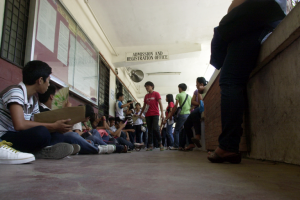By John Victor D. Ordoñez, Reporter
THE Commission on Higher Education (CHED) on Tuesday said it would roll out programs that seek to boost the credentials of Filipino college graduates and allow senior high school and technical vocational school graduates to earn degrees through work experience.
“We are also in the process of finalizing the crafting of the guidelines for micro-credentials, as well as the enhancement of the implementation of the expanded tertiary education equivalency accreditation program,” CHED Director Cherrie Melanie Ancheta-Diego told a Senate hearing.
Last month, the Senate passed a bill setting up the accreditation program, which will credit relevant work experience to school credits for a bachelor’s degree.
The program allows applicants who are at least 23 years old and have at least five years of work experience in an industry to pursue these degrees in their chosen industries.
At the same hearing, Senator Sherwin T. Gatchalian pushed an increase to the P23.38-billion budget for free college education programs, saying it would help more students earn degrees and find quality jobs.
“Free higher education is an investment,” he said. “Free higher education will yield the country more students who will graduate with a diploma, and that will enable them to look for meaningful jobs in or outside the country.”
Senator Emmanuel Joel J. Villanueva urged CHED to do something about four in 10 college students nationwide dropping out of school last year. CHED Chairman Prospero E. de Vera said many students dropped out last year because their families were still recovering financially from the coronavirus pandemic.
About 37% of students dropped out in 2021-2022. The college dropout rate spiked to 41.03% in the following school year before settling at 29.4% in 2024.
Meanwhile, the Philippine Business for Education (PBEd) urged CHED to shut down poorly performing training programs for teachers that fail to get them licensed.
“With systemic issues plaguing the current teacher education framework, updating policies and ensuring quality standards are critical in restoring trust and ensuring that only well-prepared educators enter the profession,” PBEd Executive Director Justine B. Raagas said in a statement.
More than half of teacher education institutions in the country performed below the national average in the board licensure exams for professional teachers between 2010 and 2022, she said, citing a PBEd study.
Maria Ella Calaor-Oplas, an economics professor who specializes in human capital development research at De La Salle University, said the government should lighten teacher workloads and lessen the number of students per teacher.
“Teachers are less effective in delivering their lessons if there are too many students since this is physically and mentally draining,” she said in a Facebook Messenger chat.
The government should also provide more subsidies and incentives for research papers to encourage teachers to publish more academic work, Ms. Oplas said.
The Department of Education earlier said it is looking at hiring about 26,000 teachers next year to close the gap in the country’s shortage of 46,000 educators to serve 43,000 schools nationwide.
The agency’s proposed P793.177-billion budget next year has allotted P3.43 billion for nonteaching positions to ease the administrative load for teachers.
Filipino students were among the weakest globally in mathematics, reading and science, based on the 2022 PISA. The Philippines ranked 77th out of 81 countries, performing worse than the global average.
“Teachers play a pivotal role in developing the foundational skills of our learners,” Ms. Raagas said. “Therefore, we must continuously update our strategies to ensure we recruit and train only the best educators for our students.”
